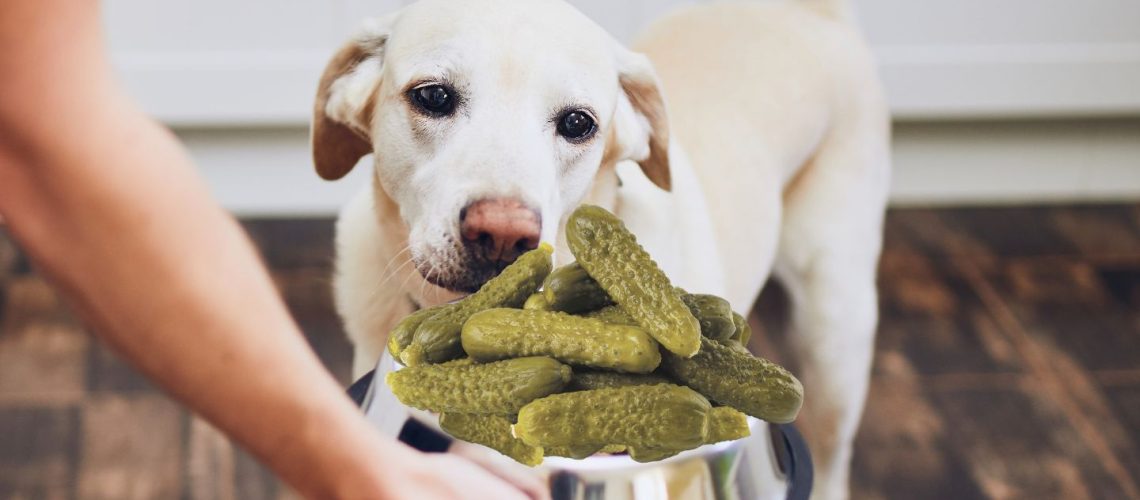The short answer is yes, dogs can eat pickles as an occasional treat but not on daily basis. Pickles can be offered sometimes as treat or in case of some digestion issue. However, it's important to understand the potential risks and benefits before offering pickles to your dog. Pickles sometimes contains garlic and onion which are toxic for dogs.
Benefits of Pickles for Dogs
Low-Calorie Treat
Pickles are low in calories and can be a healthy snack for dogs when given in moderation.
Source of Vitamins and Minerals
Pickles contain vitamins and minerals that can benefit a dog's health. For example, they are a good source of vitamin K, which is important for blood clotting and bone health. They also provide small amounts of vitamin C, potassium, and magnesium.
Vitamin K
Vitamin K is important for blood clotting and bone health.
Vitamin C
Vitamin C can help boost a dog's immune system.
Potassium
Potassium is essential for proper muscle function and maintaining electrolyte balance.
Magnesium
Magnesium supports muscle and nerve function, and helps maintain strong bones.
Prebiotics and Antioxidants
Pickles contain bacteria that can work as prebiotics, and antioxidants which can help with different functions of the body.
Prebiotic Benefits
Prebiotics can help promote healthy gut bacteria in dogs.
Antioxidant Benefits
Antioxidants can help protect the dog's body from the damage caused by free radicals and can support overall health.
Risks of Feeding Pickles to Dogs
High Sodium Content
One of the main concerns is the high sodium content of pickles. High sodium content can lead to excessive thirst and urination, as well as sodium ion poisoning, which can be serious.
Excessive Thirst and Urination
Too much sodium can cause your dog to drink more water and urinate more frequently.
Sodium Ion Poisoning
In severe cases, high sodium intake can lead to sodium ion poisoning, which requires urgent veterinary attention.
Vinegar and Bacteria
Bacteria and vinegar present in pickles can disturb the microbiota of dogs and ultimately disturbs digestion.
Digestive Upset
Vinegar can cause digestive issues like vomiting and diarrhea.
Low Blood Sugar and Loss of Appetite
Vinegar can also lead to low blood sugar and loss of appetite.
Added Spices and Flavorings
Some pickles contain added spices and flavorings, like garlic and onion, which can be harmful to dogs.
Garlic and Onion Toxicity
Garlic and onion are toxic to dogs and can cause serious health problems.
Other Harmful Spices and Ingredients
Other harmful ingredients, like certain spices or artificial flavors, can also harm your dog.
How to Safely Feed Pickles to Dogs
- Only offer a small amount of pickles as a treat, and not as a regular part of your dog's diet.
- Choose plain pickles that don't contain any added spices or flavorings, which can be harmful to dogs.
- Remove the pickle from the vinegar before offering it to your dog. This will reduce the amount of vinegar your dog consumes, and make the pickle safer to eat.
- Monitor your dog closely after feeding them pickles, and watch for any signs of digestive upset or other adverse reactions.
- Avoid giving garlic or onion if they are present with pickles because they are toxic for dogs.
Alternatives to Pickles for Dogs
Fresh Vegetables
Instead of pickles, consider feeding your dog fresh vegetables as a healthy snack. Some healthy options include:
Cucumbers
Cucumbers are low in calories and high in water content, making them a hydrating snack for dogs.
Carrots
Carrots are crunchy, low in calories, and rich in vitamins and minerals.
Green Beans
Green beans are packed with nutrients and can be a tasty treat for your dog.
Dog-Approved Treats
If you're looking for a dog-friendly treat, choose one that is specifically designed for dogs and does not contain any harmful ingredients.
Conclusion
In summary, dogs can eat pickles as a treat in moderation (step-by-step adaptation over time) but not as a part of their regular diet. However, it's important to be cautious and consider the potential risks before offering pickles to your dog. By following the tips outlined above, you can safely and responsibly feed pickles to your dog as an occasional treat.











